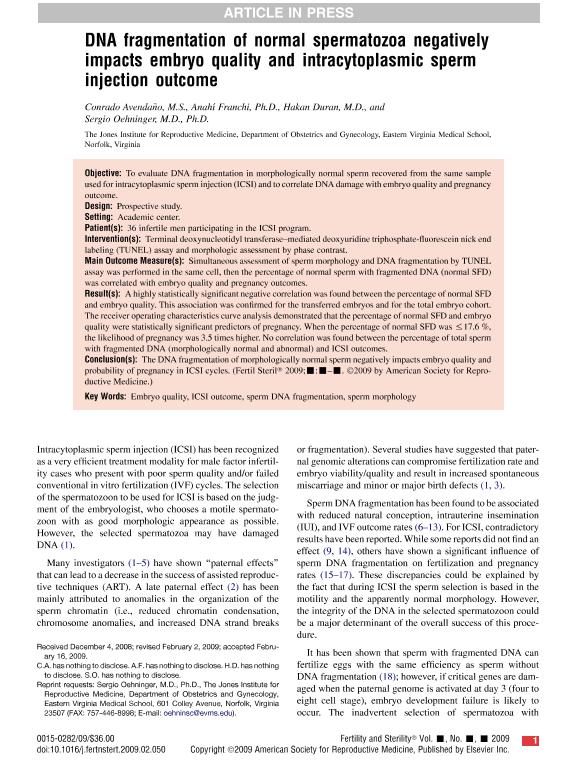Mostrar el registro sencillo del ítem
dc.contributor.author
Avendaño, Conrado
dc.contributor.author
Franchi, Nilda Anahi

dc.contributor.author
Duran, Hakan
dc.contributor.author
Oehninger, Sergio
dc.date.available
2018-07-23T19:13:41Z
dc.date.issued
2010-07
dc.identifier.citation
Avendaño, Conrado; Franchi, Nilda Anahi; Duran, Hakan; Oehninger, Sergio; DNA fragmentation of normal spermatozoa negatively impacts embryo quality and intracytoplasmic sperm injection outcome; Elsevier Science Inc; Fertility and Sterility; 94; 2; 7-2010; 549-557
dc.identifier.issn
0015-0282
dc.identifier.uri
http://hdl.handle.net/11336/52876
dc.description.abstract
Objective: To evaluate DNA fragmentation in morphologically normal sperm recovered from the same sample used for intracytoplasmic sperm injection (ICSI) and to correlate DNA damage with embryo quality and pregnancy outcome. Design: Prospective study. Setting: Academic center. Patient(s): 36 infertile men participating in the ICSI program. Intervention(s): Terminal deoxynucleotidyl transferase-mediated deoxyuridine triphosphate-fluorescein nick end labeling (TUNEL) assay and morphologic assessment by phase contrast. Main Outcome Measure(s): Simultaneous assessment of sperm morphology and DNA fragmentation by TUNEL assay was performed in the same cell, then the percentage of normal sperm with fragmented DNA (normal SFD) was correlated with embryo quality and pregnancy outcomes. Result(s): A highly statistically significant negative correlation was found between the percentage of normal SFD and embryo quality. This association was confirmed for the transferred embryos and for the total embryo cohort. The receiver operating characteristics curve analysis demonstrated that the percentage of normal SFD and embryo quality were statistically significant predictors of pregnancy. When the percentage of normal SFD was ≤17.6 %, the likelihood of pregnancy was 3.5 times higher. No correlation was found between the percentage of total sperm with fragmented DNA (morphologically normal and abnormal) and ICSI outcomes. Conclusion(s): The DNA fragmentation of morphologically normal sperm negatively impacts embryo quality and probability of pregnancy in ICSI cycles.
dc.format
application/pdf
dc.language.iso
eng
dc.publisher
Elsevier Science Inc

dc.rights
info:eu-repo/semantics/openAccess
dc.rights.uri
https://creativecommons.org/licenses/by-nc-sa/2.5/ar/
dc.subject
Embryo Quality
dc.subject
Icsi Outcome
dc.subject
Sperm Dna Fragmentation
dc.subject
Sperm Morphology
dc.subject.classification
Otras Ciencias Biológicas

dc.subject.classification
Ciencias Biológicas

dc.subject.classification
CIENCIAS NATURALES Y EXACTAS

dc.title
DNA fragmentation of normal spermatozoa negatively impacts embryo quality and intracytoplasmic sperm injection outcome
dc.type
info:eu-repo/semantics/article
dc.type
info:ar-repo/semantics/artículo
dc.type
info:eu-repo/semantics/publishedVersion
dc.date.updated
2018-07-11T17:47:05Z
dc.journal.volume
94
dc.journal.number
2
dc.journal.pagination
549-557
dc.journal.pais
Estados Unidos

dc.journal.ciudad
Nueva York
dc.description.fil
Fil: Avendaño, Conrado. Eastern Virginia Medical School; Estados Unidos
dc.description.fil
Fil: Franchi, Nilda Anahi. Consejo Nacional de Investigaciones Científicas y Técnicas. Centro Científico Tecnológico Conicet - Córdoba. Instituto de Investigaciones Biológicas y Tecnológicas. Universidad Nacional de Córdoba. Facultad de Ciencias Exactas, Físicas y Naturales. Instituto de Investigaciones Biológicas y Tecnológicas; Argentina. Eastern Virginia Medical School; Estados Unidos
dc.description.fil
Fil: Duran, Hakan. Eastern Virginia Medical School; Estados Unidos
dc.description.fil
Fil: Oehninger, Sergio. Eastern Virginia Medical School; Estados Unidos
dc.journal.title
Fertility and Sterility

dc.relation.alternativeid
info:eu-repo/semantics/altIdentifier/url/https://www.fertstert.org/article/S0015-0282(09)00469-5/fulltext
dc.relation.alternativeid
info:eu-repo/semantics/altIdentifier/doi/http://dx.doi.org/10.1016/j.fertnstert.2009.02.050
Archivos asociados
